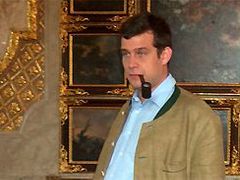
STILL IN THE HEADLINES AND ON PEOPLE´S MINDS. Largely one topic occupied all Czech media last week - Warsaw Pact troops invading Czechoslovakia on August 21, 1968.
Curiously, most of the people tend to say Soviet troops´ occupation, thus leaving out the Polish soldiers who came along as well. East German soldiers were halted at the last minute, though, as their uniforms reminded of the Nazi uniforms, the Soviet authorities were afraid of creating mayhem among the Czechoslovaks.
Well, they did anyway, as many pictures chronicling the ominous August summer days show us today, Josef Koudelka´s among them. His riveting photographs of the turmoil in the streets of Prague are displayed in the Old Town Gallery until September 13.
***
ONLY ONE PUNISHED. With the 40th commemoration of the 1968 Soviet invasion new facts and theories come to light, old stories and injustices are being remembered.
It is notoriously known these days that some members of the Czechoslovak Communist Party (KSČ) elite had collaborated with the invaders on their own volition.
Among those is the story of Karel Hoffman who headed the Central Communications Authority and who willingly cooperated with the Soviets in August 1968. The sad fact remains, though, that none of them has been ever punished but one.
***
1968 IN GEORGIA (?). Apart from Czechs and visitors to Prague, it is also Georgians who can inspect the 1968 photographs. The Georgian parliament building is currently holding an exhibit of photographs depicting the Warsaw Pact troops' invasion of Czechoslovakia on August 21, 1968 as well as pictures from the present war between Georgia and Russia that erupted two weeks ago. The juxtaposition of these two events is more than clear.
Some draw direct parallels between the 1968 invasion and the current Russian-led intervention in Georgia, some try to defy it, arguing we had no problems with secessionist ethnic minorities. Whoever is closer to the truth, any tanks trying to move around in a city cause destruction. Of the road, sidewalks, buildings and people's hearts and minds.
***
SOVIET ARMY´s LECACY IN CZECH ENVIRONMENT. Russian troops stayed in what was then Communist Czechoslovakia for 23 years, the last Soviet soldier left only in June 1991.
Though, from the Czech environment´s point of view, the Red Army is still present in a way.
Underground water in zones where the Red Army stayed is still polluted by oil substances, ground is full of heavy metals and other toxics. The areas that have been badly affected will not be clean until 2012.
***
PRAGUE SPRING LEADER. The 1968 year's turbulent events are linked above all to one name - Alexandr Dubček, Slovak politician who spearheaded the reform process of which he has become an icon.
Dubček attempted to liberalize Czechoslovakia´s socialism, which eventually led the Soviet Union to interefere.
Alexandr Dubček's son Pavol spoke to readers of Aktuálne.sk, a Slovak "sister" of the Czech online daily Aktuálně.cz online, about his father´s mysterious death, Russia´s Stalinist elite and courage.
***
JUST LIKE BROTHERS AGAIN. The two nations became brothers again. Czech President Václav Klaus visited his Slovak counterpart Gazparovič in Bratislava and together, shoulder by shoulder, they visited an exhibit of photographs of the 1968 invasion of Bratislava, as China Daily reports.
***
RISKING THEIR LIVES. While in the heart of the Soviet monolith power Soviet bigwigs were hotly discussing the issue and perhaps the future of Czechoslovakia, eight brave people gathered at Moscow's central Red Square, just a few steps from the Kremlin, to rally against the Soviet Union-led invasion of Czechoslovakia by the armies of five Warsaw Pact countries.
Pavel Litvinov, grandson of Stalin's foreign minister, former Soviet dissident and human rights advocate was one of the eight people. For showing sympathy with the Czechoslovak nation, Litvinov was sent to exile in Siberia.
In an interview for Aktuálně.cz Litvinov not only looks back at the event which directly affected his entire life, but also explains why the so called Prague Spring was of big importance to Soviet dissidents and why it is not possible to compare the latest Russian military action against Georgia with the invasion of Czechoslovakia in 1968.
***
BEATING THE RUSSIAN. Some were quick to air their joy over Špotáková´s Olympic women´s javelin gold which she won exactly on August 21. The event was all the more emotional, as Špotáková´s biggest rival was Russian Maria Abakumova, who was leading the event until Špotáková´s last-round throw.
"Many things were on my mind at that moment. It was August 21 and my rival was Russian, so I could not believe I beat her. It is incredible," said Špotáková shortly after the finals ended.
Money buys success or success buys money? Olympic success certainly brings athletes plentiful opportunities once they are back home. See here which ones Barbora Špotáková and other medal winning athletes may enjoy soon.
***
WOMEN AND FOOTBALL. Czech football referee Dagmar Damková, who made history five years ago as the first female ref to officiate a game in the Czech football league, added another notch to her belt of accomplishments: she was chosen as the main referee for the final game of the women's football tournament at the Beijing Olympics.
It was the second Olympics she took part in and getting the honor to officiate the final match of the tournament undoubtedly represents the pinnacle of her career.
***
KIDS OUT OF SOCIAL CARE HOME. The Czech Republic is one of the leading countries in the number of children that are growing up in social care homes. However, the new amendment to the civil code should change that.
One clear rule will be set for both - judges as well as social workers - first comes the family, or foster care, then the social care home.
This is good news also for the overcrowded prisons and police, as it has been proved many times in past that institutional care fails children, for majority of them is bound to have a conflict with law once they are on their own.
***
SPLIT DOWN THE MIDDLE. The issue of the fighting in Georgia split the Czech lawmakers right in the middle. While the Civic Democrats largely backed Georgia and its territorial integrity, putting all the blame on Russia, the Social Democrats were hesitant to point their finger only at one side, condemning Michail Sakaashvili´s recalcitrant approach to secessionist provinces of South Ossetia and Abkhazia.
Despite the split, the government decided to send an aid of CZK 150 million (EUR 6 million) to Georgia in order to help the Caucasian country affected by fierce fighting between the Georgian and Russian forces.
President Klaus publicly rejected to put the blame solely on Russia, arguing both sides have an equal share in the conflict.
***
NICE AND RICH RUSSIAN SPONSORS. Russians will certainly appreciate President Klaus´s sober approach to the conflict, and perhaps it will win him a few additional readers, as his latest book Blue, not green planet will be published in Russian with the help the oil giant Lukoil.
Czech environmental movement Duha (Rainbow) warned that President Klaus should be more careful about his sponsors, if he wants to be taken seriously in the climate change debate.
***
HAPPILY REMARRIED. Johannes Nepomuk Josef Norbert Friedrich Antonius Wratislaw Mena von Schwarzenberg remarried (secretly) his estranged wife, Countess Therese Hardegg, nearly twenty years after their separation.
If you do not know who is ´hiding´ behind this long aristocratic name, here is a hint: he speaks several languages, smokes a pipe and was deported from Cuba. You can see the answer here.









